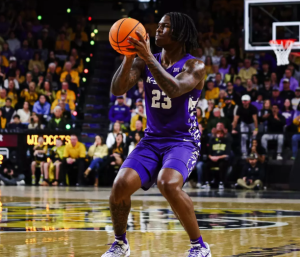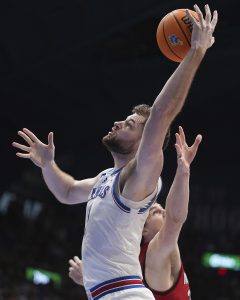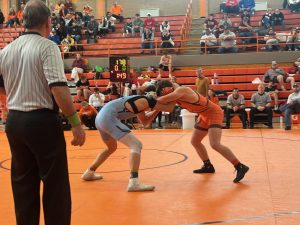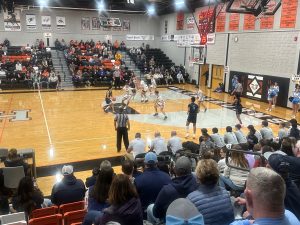Longtime college administrator Lew Perkins dies at the age of 78
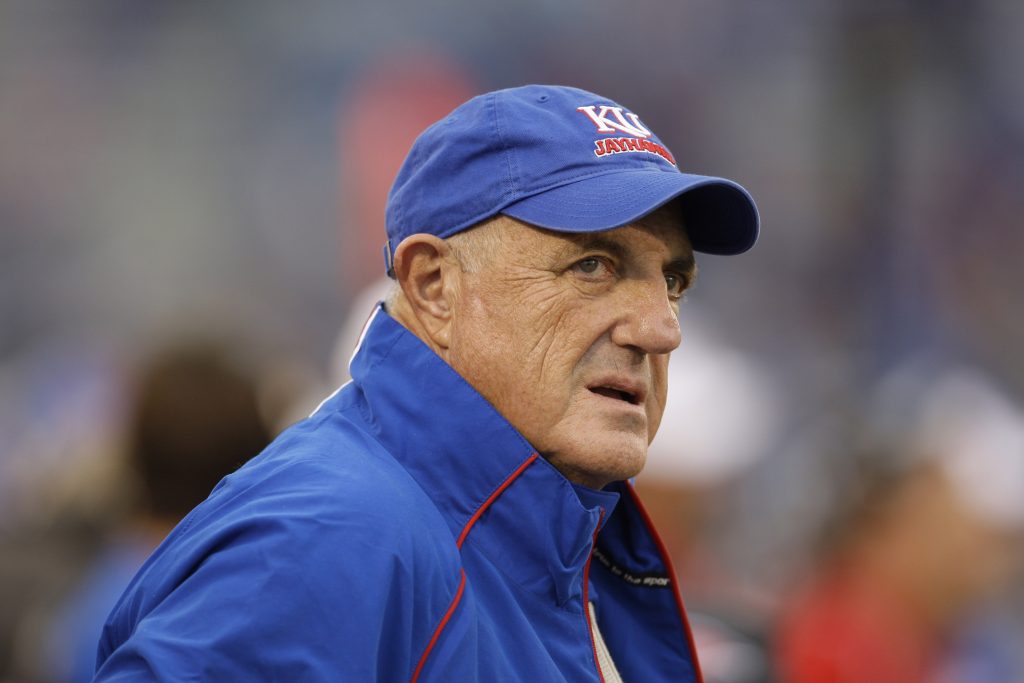
FILE - Kansas athletic director Lew Perkins watches during the second half of the team's NCAA college football game against Oklahoma on Oct. 24, 2009, in Lawrence, Kan. Longtime college administrator Perkins, who played basketball at Iowa before serving as the athletic director at several universities and taking on an influential role within the NCAA, died Tuesday, July 18, 2023. He was 78. Perkins’ family announced his death in a statement issued by Kansas. (AP Photo/Orlin Wagner, File)
By DAVE SKRETTA AP Sports Writer
LAWRENCE, Kan. (AP) — Longtime college administrator Lew Perkins, who played basketball at Iowa before serving as the athletic director at several universities and taking on an influential role within the NCAA, died Tuesday. He was 78.
Perkins’ family announced his death in a statement issued by Kansas, where he served as the athletic director from June 2003 through September 2011, a period that included a men’s basketball national championship.
No cause was given, though Perkins had been battling the effects of Parkinson’s disease.
“Lew made an indelible impact on Kansas Athletics and served his role at KU with passion and vigor on a daily basis,” Jayhawks athletic director Travis Goff said. “We will forever be grateful for his dedication to this university and athletic department. We are thinking of Lew’s amazing family during this time and sending our deepest thoughts and sympathies.”
Perkins was chosen for the Naismith Memorial Basketball Hall of Fame Board of Trustees in 2005. He also served on the NCAA championships and competition cabinet and the NCAA bowl certification committee.
Perkins grew up in Massachusetts before joining the Hawkeyes, where he played from 1965-67 under Hall of Fame basketball coach Ralph Miller. He then embarked on a career in administration at the University of South Carolina-Aiken, where he helped the school grow from a junior college to a four-year school as both athletic director and basketball coach.
Perkins returned to USC-Aiken in 2005 to receive an honorary doctorate.
He went on to serve as the associate athletic director at Penn before getting the AD job at Wichita State, which was then serving two years of probation. He made the controversial decision to end the school’s football program in a cost-saving move, but Perkins was also praised for the hiring of successful basketball coach Eddie Fogler.
Perkins left for Maryland in 1987, where the men’s basketball program was reeling from the death of star basketball player Len Bias. During his brief stay, Perkins brought in basketball coach Gary Williams, who later led the Terps to a national title.
Perkins spent the next 13 years as the athletic director at Connecticut, where the women’s basketball program won four national titles and the men’s basketball and soccer programs also claimed championships. He also was instrumental in the development of the Huskies’ football program, which joined the Division I level in 2000 and the Big East a year after his departure.
The often-affable Perkins is perhaps known for his time at Kansas, though.
While he was the Jayhawks’ athletic director, their long-downtrodden football program won the 2008 Orange Bowl under Mark Mangino and, months later, the men’s basketball national title under Bill Self. The schools’ athletic budget soared and significant upgrades were made to Memorial Stadium, the Booth Family Hall of Athletics and other facilities on campus.
Perkins’ tenure ended in scandal when, in March 2010, the school announced it was conducting an internal investigation of the athletics ticketing office. A separate investigation led by the FBI and IRS led to federal charges against five employees and one consultant and alleged that they had stolen more than $2 million in tickets to be illegally resold.
Perkins announced months later that he would retire, and he stepped away from the Jayhawks in September 2010.
“Lew did a lot of good things in his time here at KU,” Self said. “He was a big contributor in us changing the mindset of the athletic department and also competing for championships on a more consistent level. … The one thing I will remember most about Lew was he always put the student-athletes first, and the student-athletes that got to know him well, all loved him.”


